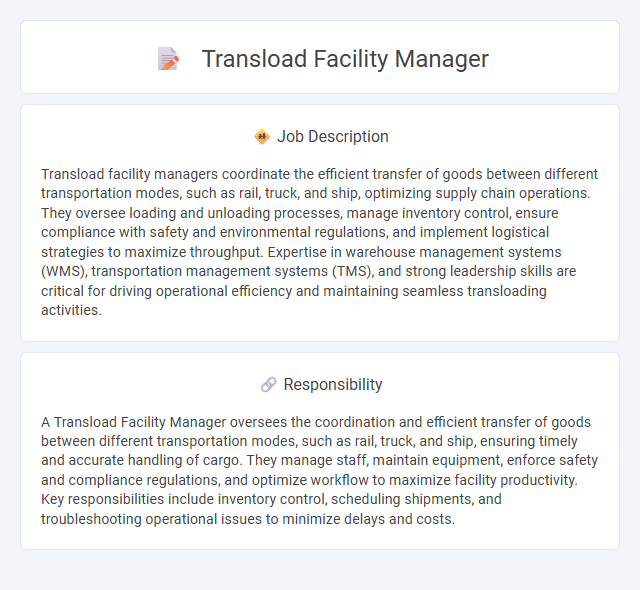
Transload facility managers coordinate the efficient transfer of goods between different transportation modes, such as rail, truck, and ship, optimizing supply chain operations. They oversee loading and unloading processes, manage inventory control, ensure compliance with safety and environmental regulations, and implement logistical strategies to maximize throughput. Expertise in warehouse management systems (WMS), transportation management systems (TMS), and strong leadership skills are critical for driving operational efficiency and maintaining seamless transloading activities.
People with strong organizational skills and the ability to manage fast-paced environments are likely well-suited for a Transload Facility Manager position. Candidates who handle stress effectively and communicate clearly with diverse teams may thrive in overseeing equipment, coordinating shipments, and ensuring operational safety. Those lacking adaptability or attention to detail might find the demands of this role challenging.
Qualification
Transload facility managers typically require a bachelor's degree in supply chain management, logistics, or a related field, complemented by experience in freight handling and warehouse operations. Proficiency in inventory management systems, safety compliance, and project coordination is essential to streamline transfer processes between transport modes. Strong leadership skills and knowledge of industry regulations ensure efficient facility operations and team management.
Responsibility
A Transload Facility Manager oversees the coordination and efficient transfer of goods between different transportation modes, such as rail, truck, and ship, ensuring timely and accurate handling of cargo. They manage staff, maintain equipment, enforce safety and compliance regulations, and optimize workflow to maximize facility productivity. Key responsibilities include inventory control, scheduling shipments, and troubleshooting operational issues to minimize delays and costs.
Benefit
A Transload Facility Manager likely experiences substantial benefits, including enhanced leadership skills and expertise in logistics operations management. Opportunities for career advancement and potentially higher compensation may arise due to increased responsibility and efficient facility oversight. Exposure to various supply chain processes could improve problem-solving abilities and industry knowledge.
Challenge
Managing a transload facility likely involves significant logistical challenges due to coordinating multiple modes of transportation and ensuring timely cargo transfers. The probability of encountering unpredictable delays or equipment malfunctions may require strong problem-solving skills and quick decision-making. Additionally, balancing safety protocols with operational efficiency could pose ongoing managerial difficulties.
Career Advancement
A Transload Facility Manager plays a crucial role in coordinating the transfer of goods between different transportation modes, ensuring efficient logistics operations. Career advancement in this field often leads to senior management positions such as Logistics Director or Supply Chain Manager, driven by expertise in inventory control, transportation planning, and vendor relations. Professionals who develop strong leadership skills and technological proficiency in warehouse management systems typically experience accelerated career growth and higher earning potential.
 kuljobs.com
kuljobs.com